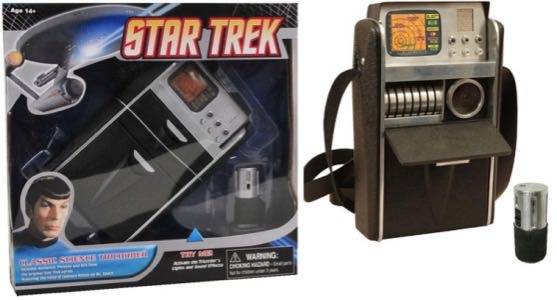
The Qualcomm Tricorder X Prize promises to turn everybody into a Doctor McCoy by 2016. It could change everything about the way we practice medicine. But are we ready for it?
If you’re a redshirt thinking you might have a case of Rigelian Fever, where do you go for advice? Whether you’re planet-side or in the sick bay, odds are you’re going to start with a tricorder. In the Star Trek universe, the tricorder was a non-invasive, handheld device that scanned geological, meteorological, and biological data. When used by medical personnel, the tricorder could diagnose all but the rarest diseases.
The tricorder inspired X Prize Foundation Chairman Peter Diamandis, who wondered whether – with enough incentive – engineers could build a medical diagnostic tool that could monitor health and identify illness on the spot, without a doctor’s assistance. Add in $10 million in total prize money from Qualcomm and you have the Qualcomm Tricorder X Prize, launched in January, 2012.

In an interview earlier this year, Diamandis described the ideal healthcare tricorder:
“A device that is easy and friendly to use that a consumer–whether that’s a mom at home at 2:00 in the morning or someone on the road–can use to diagnose themselves without having to go to a doctor or a hospital. It’s really about reinventing the future of healthcare.”
It’s a tall order, but X Prize isn’t shying away. A successful tricorder will:
- Diagnose diseases
- Provide ongoing metrics of health (vitals)
- Allow monitoring or continuous use of sensors to diagnose and measure health
- Provide awareness of health state
- Give confirmation that everything is OK with a consumer
- Notify that something is not OK (a “check engine light”)
Specifically, the tricorder will be able to identify the following 11 conditions:
- Anemia
- Urinary tract infection
- Diabetes
- Atrial fibrillation
- Strep throat
- Sleep apnea
- Melanoma screen
- Chronic obstructive pulmonary disease (COPD)
- Abnormalities in a comprehensive metabolic panel
- Hypothyroidism/hyperthyroidism
- Leukocytosis
Any winning device will have to be able to diagnose these conditions routinely and accurately.

Sounds great, right? So is there a catch?
Maybe.
Some people in the medical industry are a bit concerned. The tricorder’s goal is the “deskilling” of routine medical checks. Ultimately, for simpler ailments, it aims to remove doctors from the treatment equation altogether, down the line. Diamandis gets major points for going big in an industry as conservative as healthcare, but are we legally and physically prepared for the consequences?
There are plenty of things that could go wrong. What if a device misses a melanoma a visual inspection might have caught? Who’s legally responsible for malfunctions? Will a false sense of security cause users to skip routine physical checkups?
The Thermometer Test
To get some perspective, I ran the tricorder idea past a friend of mine who’s also an epidemiologist. He shared my enthusiasm, praising “any technology that gets people more involved managing their own health,” but immediately applied some cautionary brakes. “It’s a fantastic idea, and a big step when everyone is thinking incrementally. But it also kind of worries me.”
The reason? It might not pass “the thermometer test.”
To a doctor, the home thermometer is the single best piece of home medical equipment ever created. “It’s a perfect triage device,” my friend explained. “It provides accurate, objective information that medical personnel can use to make judgements. It’s a pretty good barometer to judge the severity of many common ailments, but it also doesn’t try to diagnose anything.”
In other words, a thermometer tells you if you’re running a fever, but it doesn’t try to tell you why. It provides critical data to healthcare personnel, but leaves the decision-making in their hands.
That can make a world of difference, particularly in situations requiring counseling or judgement of the patient’s mental state. “I’d hate to see physicians removed from the discussion. It’s not a matter of job security. It’s a matter of full-circle patient care.” He went on to surmise that absent a doctor at the point of diagnosis, users might be more likely to pursue treatment options online, or a diagnosis might unhinge a mentally fragile patient who could do harm to himself or others.
Concerns notwithstanding, self-diagnostic technology is coming, in condition-specific devices like a bra that detects breast cancer and general-purpose machines like the tricorder.
The first-gen Scanadu Scout, which falls nicely within the thermometer test zone, should be hitting the market in late 2013.
Like all data, medical information is useful only if its used properly. Here’s hoping that patients accept some responsibility along with their flashy new devices.
Lead image from Memory Alpha.

















